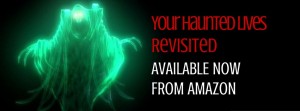
Is there anyone out there who isn’t scared of the books G. Michael Vasey writes? His “Your Haunted Lives” series has been tearing up the Amazon charts for some time now. His audiobooks are favorites of listeners who like their books creepy, and his blog “My Haunted Life Too” is one of the most diverse collections of paranormal stories you could ever wish to read. But what keeps G. Michael Vasey running? This interview should shed some light on the darkest recesses of his mind…
Who do you have in mind when you write?
Me. I write about my interests and things that I am passionate about. I trust that the end product is something of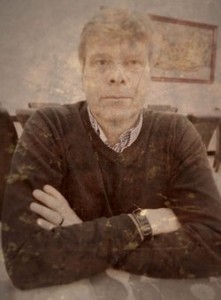
interest to others and that I have something unique to offer – my perspective, and one that is entertaining and different.
How do you find “inspiration” and where does it live?
Inspiration often comes to me in a semi-meditative state. So listening to music of the right type can start the juices flowing, or sometimes I listen to meditation music on Youtube as I write. It seems to relax me and open a channel to the creative part of me. Other books can also give inspiration, too, so when I am reading something it will trigger a series of questions or thoughts and an inner dialogue. Finding inspiration is not difficult, to be honest. If you look around and pay attention to what is around you, how can you not be inspired? For example, until recently, I lived in Prague. Most people tramp to work, head down, worrying about the day ahead or wishing themselves miles away. As I walked through Prague to work, I looked up – at the glorious architecture and beauty, history and sheer wow of the city I lived in… that inspires me.
Have you always aspired to be a writer?
No, but writing has always been a key part of what I do for a living, and I have always enjoyed writing. Being an author sort of sprung up on me when I realized what a body of work I had published as articles, newsletters, book chapters and so on. Once I got comfortable with the idea, I thought – why not give it a proper go?
Tell me about how you became a writer. What was the first step for you?
Having to write is a part of my job. I must have written well over 500 articles in newsletters and magazines professionally along with 100 white papers and reams of blog articles. So, it is something I do continually. The step you ask about is probably when I first sat down with the objective of writing a book, and I did that because I was told to in meditation…
Do you have a distinctive “voice” as a writer?
I don’t know, to be honest, but in poetry I do try to play with words in certain evocative ways.
Do you think anyone can learn to be an effective writer, or is it an unnamed spiritual gift?
I think anyone who really wants to write can learn, but very few writers are true masters. That is a gift that you are born with.
Is there a book you’ve written that you’re most proud of?
No, as I tend to keep looking forward as opposed to backwards. That’s not to say there isn’t a book I am fond of. My novel, The Last Observer, though certainly not perfect, is my favourite book to date; and my last book of poetry – Moon Whispers – I think is my strongest effort yet. I pick the novel because it has the potential to appeal to a broader group of readers, I think.
On average, how long does it take for you to write your ideas down before you start writing a book?
I don’t follow this approach, usually. I plan it in my head and then, after it’s going, I start to write down sub-plots and themes I wish to develop. In the end, though, the books have a surprising talent for writing themselves and surprising even me. I suppose it’s because I usually write in a meditative state, and it’s as if it’s not me doing the writing anyway.
What would you say is the “defining” factor in your writing? What makes it yours?
Ah, good question! I think it’s my passion for trying to understand the nature of reality and my practise of magic. You see, I think magic (or if you prefer, metaphysics) has already described the Universe, and science is gradually catching up. What fascinates me is how we create our own reality or our own perspective on reality and how imagination and will can make magic. This provides for a never-ending smorgasbord of ideas, plots, endings and concepts to play with.
How do you guard your time to do what’s most important?
I am a multi-tasker and am always engaged in fifteen things at once. I move my focus from one thing to another and that constant variety keeps me engaged and busy.
What are some of the more common distractions you struggle with, and which ways have you found to overcome them?
There are times when I simply do not want to write. So I don’t.
What kind of review do you take to heart?
Oh, I hate bad reviews and take them ever so personally. It seems to me that there are a few people out there that simply get a kick out of writing deeply negative reviews – like trolls on a discussion board. I can’t help being hurt by deeply negative criticism. On the other hand, we only get better through criticism. It is how that criticism is delivered that makes the difference between something we gain from or something we are hurt by.
How do you decide what your next book will be about?
Well, I decide probably in a moment of massive interest in something or an idea, but then I end up writing something else entirely! For example, on my bio it says I am writing a book about the Fool in magic. It’s a great idea, and I have written a few pages, but I keep finding other things to write about, and I make no progress at all on that idea. I keep it in the bio to remind me that I must/should/will write that book.
Was there a link between your childhood and your vocation as a writer?
Yes – imagination. I had and still do have a very well developed imagination to the point I can really be where I imagine I am. It is this imagination that runs riot and is the creative seed within me.
As a writer, however, you have the opportunity to self-reflect, to revisit experiences. How does that feel?
Sometimes good but not always… often, the worst of life’s experiences are actually the best – at least for writing.
What motivates you to tackle the issues others may avoid, such as nature and spirituality?
I have been interested in such things since I was knee high to a grasshopper as I wrote in my first book – Inner Journeys. Back when I was 12, I was attending meetings of the church for psychical research and reading Blavatsky… So, I am well-grounded in this stuff and a practising magician to boot. As a result, I guess I see the world a bit differently and want to share the idea that the world looks like you want it to.
When you start a new book, do you know how a book will end as you’re writing it? Or does its direction unfold during the writing, research and/or creative process?
The Last Observer wrote itself, I swear. The ending surprised me and still does.
How do you see your role in impacting and influencing society?
I only hope that I can make people think a bit, wake up and look around and see that not everything is how they were taught. If they do that, then I have already succeeded.
If you weren’t a writer, what would you like to do?
Writing is so integral to everything I do, and it’s not possible to answer this question.
What are the things a writer “must not” do? You know, I don’t like rules. Why should a writer not do anything? I do feel sometimes that we are constrained by success, but real art is breaking all the rules and having the product mean something. This is why I love poetry – there are NO rules. I hear some people criticising Indie writers as if the only people who should write are Shakespeare and his ilk; but this is literary snobbishness, isn’t it? Everyone should be able to write if they so choose, and if they break rules of grammar but people love their stuff, then great….
What are some pieces of advice that you would give someone on writing well?
I would never tell someone how to write – I think people should write as they wish, and some will deem it to be good and some bad.
Young writers often make foolish mistakes. What is a mistake to avoid?
Answering a bad review… don’t do it. Ever. I did, and I learned.
What obstacles and opportunities do you see for writers in the years ahead?
The whole industry is in flux with eBooks, Amazon and so on. Trying to keep up with how to market what you write, how to make money, how to find an audience, whether to self-publish or not? It’s knowing how things will fall out that could present either an obstacle or opportunity.
Could you talk about one work of creative art that has powerfully impacted you as a person?
Yes – a CD by Blackfield called Blackfield II. The music on that CD inspires me to write, and it feeds my creative juices. Every single poem in Moon Whispers was written listening to that CD. In fact, music often is the work of creative art that sends me….
What relationship do you see between imagination and creativity, and the real world?
Imagination and creativity are intertwined like lovers – one needs the other, and together they make beautiful music.
For a writer, it is easy to become an elitist. Have you ever (or do you still) struggle with pride as an author?
Not really – I do what I do and lots of people do the same so there is nothing special about me. But let’s see how I behave if I ever have a real best seller, shall we?
With all your success, how do you stay humble?
Age. I am that sort of age where nothing much impresses me anymore, least of all myself.
Have you ever considered writing fiction full time?
I would love to… will you get me a contract?
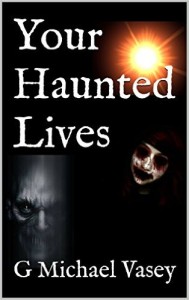 One of the bestselling Vasey collections is his “Your Haunted Lives” book. With hot sales, and terrified fans this selection of stories is likely to keep you up all night, wondering what is hiding in the dark corners of your house!
One of the bestselling Vasey collections is his “Your Haunted Lives” book. With hot sales, and terrified fans this selection of stories is likely to keep you up all night, wondering what is hiding in the dark corners of your house!
A truly unique set of tales of the supernatural that will give you goosebumps and have you looking over your shoulder.
The second book in this series is also available!

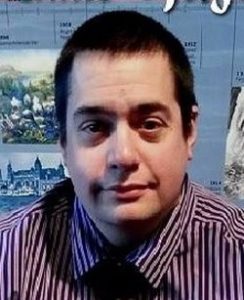 You know the younger generation loves Westerns, too. Take a guy like Denny Gager who writes Westerns for a modern audience. His “Storm to the Past” has been a huge success for the company—and since then, he’s released two more books. You can’t normally tie down a guy with such publishing energy for an interview—but we’ve managed it! Welcome Dennis Gager, star of “Storm to the Past.”
You know the younger generation loves Westerns, too. Take a guy like Denny Gager who writes Westerns for a modern audience. His “Storm to the Past” has been a huge success for the company—and since then, he’s released two more books. You can’t normally tie down a guy with such publishing energy for an interview—but we’ve managed it! Welcome Dennis Gager, star of “Storm to the Past.”
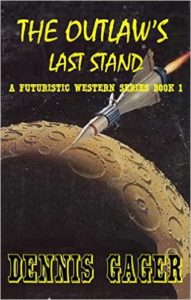
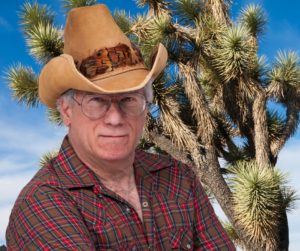 Frank F. Fiore has been one of the most interesting hit makers of 2016. His new book “Gunfight at Black Ridge” came out of nowhere and broke into the top 100. He has another on the way, and another, and another, and another. His next book will turn the western on its head and take the genre in a brand new direction. It’s called “Jonathan Smyth: Cowboy Sleuth,” and looks set to excite Western readers around the world… I think you’ll enjoy this interview with the mighty Frank F. Fiore!
Frank F. Fiore has been one of the most interesting hit makers of 2016. His new book “Gunfight at Black Ridge” came out of nowhere and broke into the top 100. He has another on the way, and another, and another, and another. His next book will turn the western on its head and take the genre in a brand new direction. It’s called “Jonathan Smyth: Cowboy Sleuth,” and looks set to excite Western readers around the world… I think you’ll enjoy this interview with the mighty Frank F. Fiore!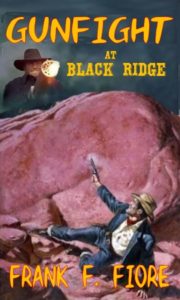
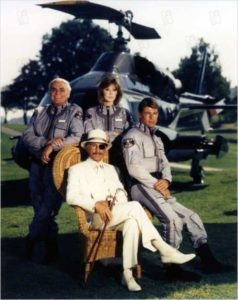 With an appearance at the Memphis Film Festival imminent, and a new Western rumored to be on the way, this interview with Alex Cord will bring us up-to-date. Alex is currently riding high on Amazon with his second book, “A Feather in the Rain,” which won awards and gathered acclaim from around the world. He is still as active as ever, running his
With an appearance at the Memphis Film Festival imminent, and a new Western rumored to be on the way, this interview with Alex Cord will bring us up-to-date. Alex is currently riding high on Amazon with his second book, “A Feather in the Rain,” which won awards and gathered acclaim from around the world. He is still as active as ever, running his 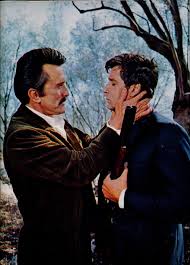 During those early days, you obviously took a great interest in the literary side of the business. Your love of great writers and playwrights like Shakespeare is well known. How did you go from student of the Bard to professional actor, working at the Stratford, Connecticut Shakespearian Festival?
During those early days, you obviously took a great interest in the literary side of the business. Your love of great writers and playwrights like Shakespeare is well known. How did you go from student of the Bard to professional actor, working at the Stratford, Connecticut Shakespearian Festival?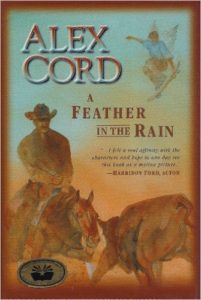
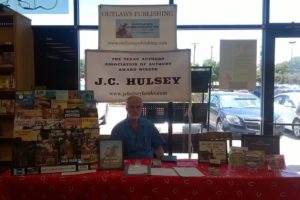 This interview is with one of the leading western publishers of today. His name is J.C. Hulsey, and his publishing house “Outlaws Publishing” is currently having huge success with western authors from around the world. Names like Cliff Roberts, Dennis Gager, John D. Fie. Jr, Frank F. Fiore, Kenneth S. Pratt are household names to western readers.
This interview is with one of the leading western publishers of today. His name is J.C. Hulsey, and his publishing house “Outlaws Publishing” is currently having huge success with western authors from around the world. Names like Cliff Roberts, Dennis Gager, John D. Fie. Jr, Frank F. Fiore, Kenneth S. Pratt are household names to western readers.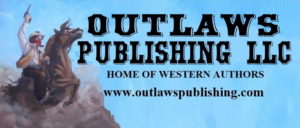

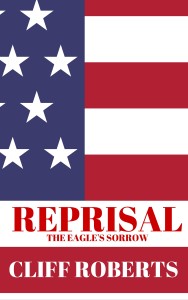
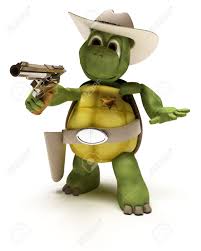 How did G.P. Hutchinson achieve one of the fastest selling Westerns of the year? How did he go from moving a few copies a month, to having close to a million pages of his book read in a single month? What was the magic ingredient? The truth is, there isn’t a magic ingredient. There was just one thing—consistency.
How did G.P. Hutchinson achieve one of the fastest selling Westerns of the year? How did he go from moving a few copies a month, to having close to a million pages of his book read in a single month? What was the magic ingredient? The truth is, there isn’t a magic ingredient. There was just one thing—consistency.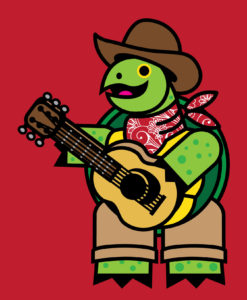 of time building relationships, understanding people, growing knowledge of the business. I built a practical understanding of promotion on a budget, and I was lucky enough to have success. From book to book, my experience grew, and I honestly now can’t remember a single book promoter who started in the book business at the same time I did. I think they all fell asleep by trees, hugging their hot water bottles as I crept by.
of time building relationships, understanding people, growing knowledge of the business. I built a practical understanding of promotion on a budget, and I was lucky enough to have success. From book to book, my experience grew, and I honestly now can’t remember a single book promoter who started in the book business at the same time I did. I think they all fell asleep by trees, hugging their hot water bottles as I crept by.

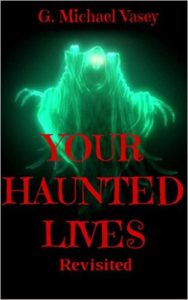

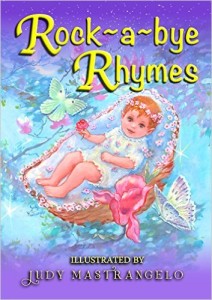
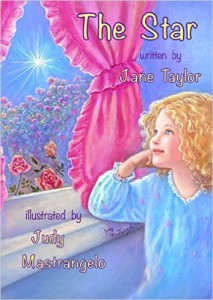
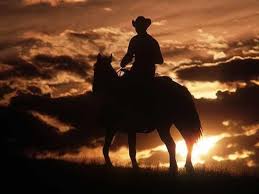
 O
O
Recent Comments